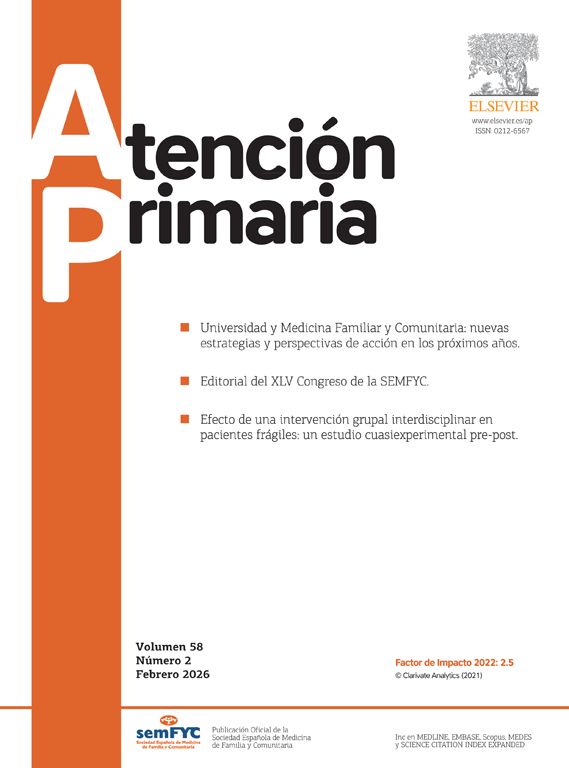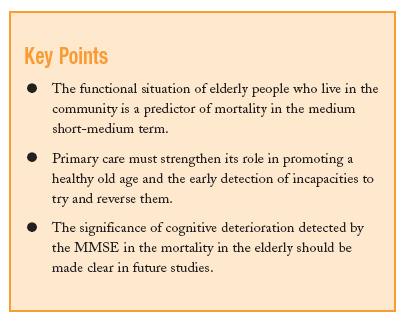Primary care is the level of health care which a greater number of elderly people attend. Its function is to carry out preventive activities to achieve a healthy old age, the early detection of diseases and incapacities, to be able to reverse or stop their progression, and care at the end of life which favours a dignified death.1 The availability of valid tools which enable the detection, monitoring and prediction of the evolution of their state of health is essential to be able to carry out these functions.
The work of Regal et al2 in this issue of primary care is particularly interesting in this context, which is the search for tools or diagnostic tests which give information on what may be taking place in an elderly person, depending on their basal condition. The tool evaluated is the comprehensive geriatric assessment, considering the predictive power of mortality in its different components. Their results show that the functional situation of the elderly person and the errors in the Mini-Mental State Examination (MMSE) are the main independent predictors of mortality at 70 months of follow-up.
The functional situation of the elderly is a major determining factor of their capacity to live in the community, their quality of life, their recovery capacity and their mortality in the short term when they are admitted to hospital with serious illnesses. A basic physical situation, expressed as the absence of incapacity for the performance of activities for daily living, is a marker of the "strength" of the patient to confront external problems. And this effect is independent of age. On the other hand, the functional incapacity appears to behave as an indicator of a situation of general debility which, independent of the morbility, is a predictor of mortality, in the medium term, in people who live in the community. The results of Regal et al2 corroborate previous observations originating from another longitudinal study3 carried out in our country and with a cohort of elderly people with a different state of health. The repeated observation confirms that it is not a casual finding. The consequences of these observations are obvious: it must be acted on, to delay, where possible, the appearance of incapacities. And for this reason, the activity of primary care, as a promoter of a healthy old age and the early detection and intervention of functional disturbances, is fundamental.
The studies available, however, do not offer a prediction of mortality in the short term, as this is also important in the care of incapacitated elderly people. The diagnostic and therapeutic decisions when faced with illnesses must be based on the knowledge of the possibilities of one result or another depending on the functional situation of the elderly person. Other investigations, centred on patients with deterioration of two or more basic functions of daily living, are required to find out the impact of these deficiencies in the mortality at 3, 6, or 12 months. Also, in these studies it should be evaluated whether the predictive capacity of mortality in the very short term of a functional problem continues to be independent of the type of illness.
The results of Regal et al2 agree with those obtained by other authors4,5 as regards the influence of cognitive deterioration and, in particular, Alzheimer-type dementia (ATD)on the mortality in the short-medium term in elderly people. In the study by Regal et al2, however, it highlights the predictive capacity independent of the MMSE scores when these represent "losses" as regards the normal score. The interpretation of these findings pose some difficulty. The robustness of the prediction contrasts with the limitations of the tool and the interpretation of their results. The influence of gender, cultural level, and training for re-examining on the diagnostic performance of the MMSE and its variations are known. These factors would change the predictive capacity, in the same person, only by obtaining more or less points in the MMSE. It would be more logical to consider that the MMSE scores are really predictors as regards pointing out particular grades of severity in cognitive deterioration, and ATD, which are clearly associated with mortality in the medium to long term of the elderly. The results obtained by Regal et al,2 however, lead to the interesting observation in that minimal cognitive changes, expressed as subtle losses of points in the MMSE normal range, can already have a predictive value of mortality at 70 months follow-up. It could be that the short neurophysical examination which the MMSE provides, may have the capacity to detect variations, considered up until now within normal, which show up a situation of general debility which determines a poor prognosis. It is known that the central nervous system is particularly sensitive in the elderly and in its function the repercussions of inadequate function of other organs are expressed. The MMSE could then behave as a "major" variable in which the influences of debilitating diseases are expressed in the mortality. The results should also help when considering the interpretations of what is the change and the normality in the MMSE scores.
The investigation by Regal et al2 validates the previous opinions on the importance of the functional diagnosis in the elderly and the early diagnosis of dementia in primary care. However, it should be remembered that there is no suitable evidence available which guarantees the generalised use of the comprehensive geriatric assessment in primary care.








